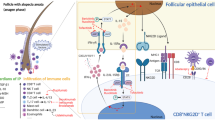Abstract.
Objective and Design: Riboflavin, also known as vitamin B2, is a micronutrient with a key role in maintaining human health. It has also been shown to enhance host resistance to bacterial infections in mice. The aim of this study was to assess the role of vitamin B2 treatment in inflammatory conditions.
Subjects and Methods: Three models of inflammatory states were assessed. One of them encompasses neutrophil mediated but T cell/macrophage independent cutaneous inflammation. Another one is delayed type hypersensitivity reaction (DTH), a T cell/macrophage dependent but neutrophil independent inflammatory response. The third one is collagen- induced arthritis, having components from both of the above described reactions. Mice were treated with vitamin B2, administered by peritoneal injections, throughout the course of the experiments.
Results: The granulocyte dependent reaction to olive oil was significantly reduced in vitamin B2 treated mice. In contrast, DTH reactivity and collagen II arthritis were not affected by the treatment.
Conclusion: Riboflavin administration affects neutrophil migration but does not alter acquired immune responsiveness.
Similar content being viewed by others
Author information
Authors and Affiliations
Corresponding author
Additional information
Received 20 April 2005; returned for revision 9 June 2005; returned for final revision 29 June 2005; accepted by M. Parnham 5 July 2005
Rights and permissions
About this article
Cite this article
Verdrengh, M., Tarkowski, A. Riboflavin in innate and acquired immune responses. Inflamm. res. 54, 390–393 (2005). https://doi.org/10.1007/s00011-005-1372-7
Issue Date:
DOI: https://doi.org/10.1007/s00011-005-1372-7




